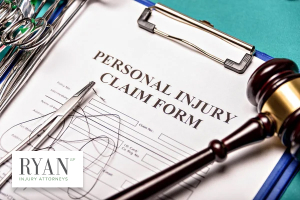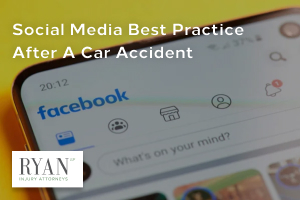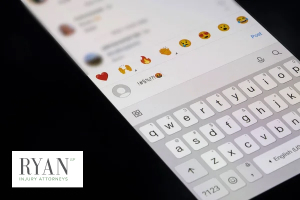
In today's digital age, social media plays a significant role in our daily lives, but it can also impact legal matters, such as car accident claims. Understanding how social media content can affect your claim is crucial. Ryan LLP is here to guide you through the complexities of this modern issue.
The use of social media has grown immensely, and so has its influence on legal proceedings. When you're involved in a car accident claim, what you post online can either support or weaken your case. Our team at Ryan LLP emphasizes the importance of being aware of your online presence during this critical time.
Your social media accounts and online platforms can impact your personal injury claim or personal injury case. Even seemingly harmless comments on social media sites are a bad idea. After car accidents, call us for a free consultation.
Social media profiles are a significant source of evidence in car accident claims. What you post, share, or even like can be scrutinized and used in the claims process. For instance, a simple photo or status update can reveal more about your physical condition and activities than you might intend.
Insurance companies and opposing lawyers often scan social media for any evidence that could challenge your claim. They look for inconsistencies between your online activity and your injury claims. The other side can gain access to your private posts through legal channels. The insurance adjuster may also try to access your social media accounts. Understanding that anything you share online can become part of your claim's evaluation is crucial.

Social media evidence can significantly impact your compensation. For example, posts that suggest physical activity or well-being can contradict claims of injury or emotional distress. It's not just your posts that can play a role; comments and reactions from friends or family can also play a role.
The courts have increasingly accepted social media content as evidence. While this can benefit your case by providing supporting evidence, it can also harm your claim if the content suggests a different story than the one you're telling legally. Therefore, being cautious and conscious of your social media activity is essential.
Social media evidence can come in various forms, each capable of influencing the outcome of a car accident claim.
Your posts and status updates are often the first things an insurance company will scrutinize. A simple post about going out with friends or engaging in activities can be misinterpreted as evidence of a lack of injury. Even posts unrelated to the accident can be used to gauge your emotional and physical state.
Context becomes key. A post made in jest or as an exaggeration can be taken literally in a legal context. It's not uncommon for insurance adjusters or opposing lawyers to present these posts as concrete evidence, often omitting the context or intent behind them.
Photos you upload or are tagged in can provide visual evidence about your condition and physical activities post-accident. For instance, a photo showing you engaging in physical activity could contradict claims of injury or limited mobility. Managing your tags and reviewing your privacy settings to control this aspect is crucial.
Photos from before the accident can also be significant. They might be used to establish your pre-accident condition or activities. Thus, you must be aware of your social media history, not just recent posts.
Livestreams or videos you share can offer real-time evidence of your activities and statements. These are often more reliable than written posts, as they are easier to interpret. Insurance companies may use these to assess your physical and emotional state post-crash.
In the next phase, the content of your live streams or videos becomes critical. They can reveal details inadvertently, such as background information or offhand comments, that might contradict your claim. Being mindful of what you record and share is critical.

A. Guidance on What to Avoid Posting: After a car accident, it's best to avoid posting any details about the incident, your injuries, or your recovery. Even seemingly innocent posts can be misconstrued and used against you in your claim.
B. Importance of Privacy Settings: Adjusting your privacy settings is crucial to controlling who sees your posts. However, remember that private posts can still be accessed through legal means, so privacy settings are not foolproof.
C. Recommendations for Consulting With Legal Counsel Before Sharing Information: Consult your attorney before posting anything related to your accident or injuries. They can advise on what might negatively impact your claim.
Social media content can present challenges in court, particularly regarding its admissibility and authenticity. Courts often require proof that the content is genuine and directly relevant to the case. This means showing that you made the posts and reflected your condition or state of mind.
However, proving the context and intent behind social media content can be difficult. It can also be challenging to accurately represent the meaning of social media posts in court. Lawyers must navigate these complexities carefully to ensure that social media evidence is used fairly and accurately.

Limiting your social media activity after a car accident is wise. Posting online can inadvertently harm your claim, even if you think the content is harmless.
A single post can be misconstrued, leading to misunderstandings about your condition or actions. For example, a photo or comment meant as a joke can be presented as severe evidence, weakening your claim.
Remember that context often gets lost in legal proceedings. Your tone, intent, and the circumstances of a post are only sometimes evident, leading to potential misrepresentations of your state of mind or physical condition.
Social media posts can sometimes conflict with your official statements in your claim. Any contradiction, no matter how small, can be used to challenge your credibility. Maintaining consistency in what you communicate publicly and in legal settings is essential.
Consider how your online persona aligns with your legal statements. Even subtle differences can be significant in the eyes of the law. Your online activity should reflect the same narrative as your legal claim.
Location check-ins on social media can provide information about your whereabouts and activities. These check-ins can track your movements and activities, possibly contradicting claims of injury or immobility.
Be aware that frequent check-ins or activities suggest a level of physical capability that conflicts with your injury claim. It's advisable to avoid location-based posts while your claim is ongoing.
Photos can speak volumes about your condition post-accident. A picture that shows you being active or not visibly injured can contradict your claims of suffering or limitation. Always be mindful of the visual story your photos tell.
Remember that images are powerful and often viewed as more credible than written posts. They can create a lasting impression, so it is essential to ensure they align with your claim's narrative.
A. Admitting Guilt or Expressing Remorse for the Accident: Avoid posting anything interpreted as admitting fault or expressing remorse. Even if you meant them sympathetically, these statements can be used against you.
B. Sharing Photos of Yourself or Your Activities: Photos can contradict claims of injury or emotional distress. Be cautious about what images you share, as they can provide a misleading impression of your condition.
C. Discussing Details About the Accident or Your Injuries: Avoid sharing details about the accident or your injuries. These discussions can be misinterpreted and used to challenge your claim.
D. Responding to Comments From Unfamiliar Individuals: Be cautious when interacting with unfamiliar individuals online. They might be gathering information for the opposing side.
E. Accepting Friend Requests From People You Don't Know: Be wary of accepting friend requests from people you don't know, as they might be connected to the opposing party in your claim.
F. Deleting Your Posts: Avoid deleting posts after your accident, as this can be seen as tampering with evidence. Consult with your attorney before making any changes to your social media content.

Insurance companies often use social media to gather evidence that can weaken your claim. They look for posts, photos, or comments that contradict your reported injuries or the impact of the accident. Even casual remarks or activities can be used to challenge the severity of your injuries.
Insurers may also monitor your social media to track your recovery progress and daily activities. They use this information to assess whether your lifestyle matches your injury claims. It's important to remember that insurance adjusters are skilled at interpreting social media content to their advantage.

Navigating a car accident claim in the age of social media platforms requires careful consideration and expert legal guidance. At Ryan LLP, we understand social media's challenges and opportunities in personal injury cases.
If you've recently been involved in a car accident, managing your social media wisely and seeking professional legal advice is crucial. Contact us today for a consultation. We'll help you understand the impact of your social media activity on your claim and provide the support you need to navigate this complex process.
Don't let a simple social media post affect your legal rights – call us now for expert assistance.